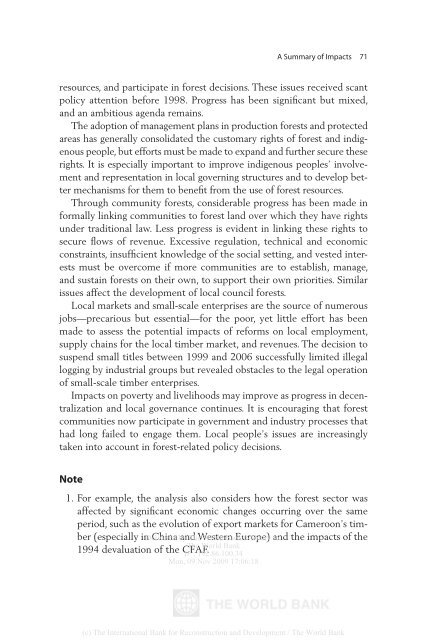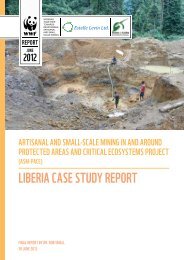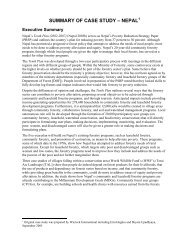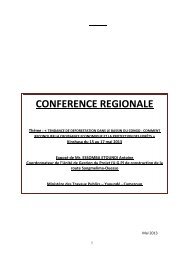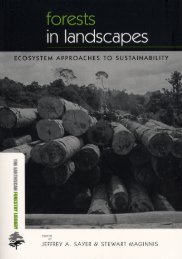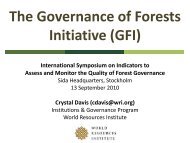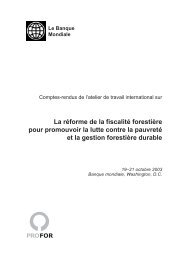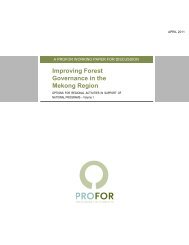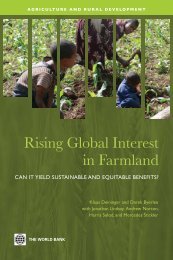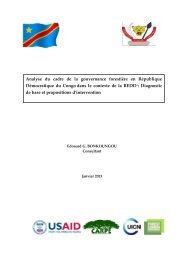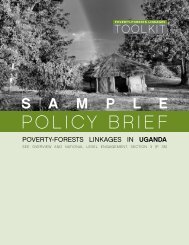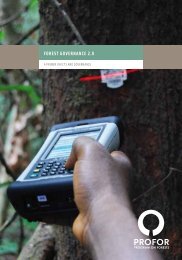The Rainforests of Cameroon - PROFOR
The Rainforests of Cameroon - PROFOR
The Rainforests of Cameroon - PROFOR
- No tags were found...
You also want an ePaper? Increase the reach of your titles
YUMPU automatically turns print PDFs into web optimized ePapers that Google loves.
A Summary <strong>of</strong> Impacts 71resources, and participate in forest decisions. <strong>The</strong>se issues received scantpolicy attention before 1998. Progress has been significant but mixed,and an ambitious agenda remains.<strong>The</strong> adoption <strong>of</strong> management plans in production forests and protectedareas has generally consolidated the customary rights <strong>of</strong> forest and indigenouspeople, but efforts must be made to expand and further secure theserights. It is especially important to improve indigenous peoples’ involvementand representation in local governing structures and to develop bettermechanisms for them to benefit from the use <strong>of</strong> forest resources.Through community forests, considerable progress has been made informally linking communities to forest land over which they have rightsunder traditional law. Less progress is evident in linking these rights tosecure flows <strong>of</strong> revenue. Excessive regulation, technical and economicconstraints, insufficient knowledge <strong>of</strong> the social setting, and vested interestsmust be overcome if more communities are to establish, manage,and sustain forests on their own, to support their own priorities. Similarissues affect the development <strong>of</strong> local council forests.Local markets and small-scale enterprises are the source <strong>of</strong> numerousjobs—precarious but essential—for the poor, yet little effort has beenmade to assess the potential impacts <strong>of</strong> reforms on local employment,supply chains for the local timber market, and revenues. <strong>The</strong> decision tosuspend small titles between 1999 and 2006 successfully limited illegallogging by industrial groups but revealed obstacles to the legal operation<strong>of</strong> small-scale timber enterprises.Impacts on poverty and livelihoods may improve as progress in decentralizationand local governance continues. It is encouraging that forestcommunities now participate in government and industry processes thathad long failed to engage them. Local people’s issues are increasinglytaken into account in forest-related policy decisions.Note1. For example, the analysis also considers how the forest sector wasaffected by significant economic changes occurring over the sameperiod, such as the evolution <strong>of</strong> export markets for <strong>Cameroon</strong>’s timber(especially in Delivered China by and <strong>The</strong> Western World Bank Europe) e-library and to: the impacts <strong>of</strong> the<strong>The</strong> World Bank1994 devaluation <strong>of</strong> the CFAF. IP : 192.86.100.34Mon, 09 Nov 2009 17:06:18(c) <strong>The</strong> International Bank for Reconstruction and Development / <strong>The</strong> World Bank


